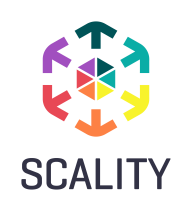


Scality RING and Dell ECS compete in the object storage market. Scality RING has the upper hand in scalability and support, making it ideal for organizations requiring significant assistance and growth potential, while Dell ECS excels with its advanced features, garnering preference despite higher costs.
Features: Scality RING's prominent features include strong scalability, flexibility, and efficient management of mixed workloads. It smoothly integrates with various platforms. Dell ECS distinguishes itself with advanced security features, comprehensive analytics capabilities, and seamless integration with cloud environments, providing an enriched experience for complex organizational needs.
Room for Improvement: Scality RING could improve by enhancing its user interface for increased ease of use, expanding its out-of-the-box analytic tools, and providing more detailed documentation for self-service deployment. Dell ECS can work on simplifying its deployment process, offering more competitive pricing models for mid-sized companies, and continuously improving its customer support response times.
Ease of Deployment and Customer Service: Scality RING is praised for its straightforward deployment process, backed by an efficient customer service team ready to offer fast and reliable support. Dell ECS deployment, slightly more complex, benefits from thorough documentation and professional services, appealing to enterprises seeking comprehensive installation assistance.
Pricing and ROI: Scality RING offers competitive pricing structures focusing on minimizing upfront costs to ensure a quicker ROI. Dell ECS, despite higher initial expenses, provides significant long-term value with its advanced features, making it a strategic choice for companies valuing feature depth over initial expenditure.
It does not require much management once you set up correctly, so it saves time, allowing an admin to focus on other work.
I think RING's ability to maintain predictable costs while providing scalable storage solutions impacts our budget by allowing us to pay only for capacity.
For instance, while the cost per gig on a block storage platform may be $2, it's $1.50 for NAS, and only $0.50 for object storage, leading to a remarkable 75% reduction in costs by utilizing the Scality platform.
Scality RING has reduced our operating costs.
I would rate them an eight out of ten.
The support is done through email and is not that great, making it a very problematic area I've been dealing with for over four years.
There is a lack of SUSE Linux experts which affects the level of support.
The response time and quality of the technical support are satisfactory.
Customer support is generally good but sometimes struggles with complex issues.
I've always received responses within the required timeframe, the answers were technically relevant, and there was follow-up—people called us back to check if everything was okay and if the ticket could be closed.
Individuals such as Peter Mikolastik really make a difference by saying, 'Come on, what is the problem? I will help you,' rather than just brushing things off.
Technically, when we have major issues in P1, they are very responsive and we can't say that we don't get a response.
Pure Storage FlashBlade is scalable.
Through the fabrics, it provides the clustering, allowing us to add nodes easily.
It allows scale-out processes by adding extra nodes, providing flexibility for customers to increase capacity on demand.
I would rate scalability between eight or nine, as it provides a good ability to scale and expand storage.
Upwards, I think, almost unlimited by what we can imagine.
I've never had issues with scalability.
We are relatively well informed about their new features, what will be implemented in future versions, and the scalability of the solution.
In case there is any issue with any blade, the data is moved to another.
We have not experienced any outages in the last four years.
I'd rate stability maybe 9.5 out of ten.
Dell ECS provides high stability compared to other object solutions.
It is a platform that is very stable at the customer level and does not generate incidents or blockages that you might encounter with standard storage solutions, where you can lose data.
I find that Scality RING is very stable because it allows for many maintenance operations without service loss.
There are factors that can cause Scality RING to become occasionally unavailable, but due to the system's resilience, it is capable of recovering or degrading gracefully.
Technical support definitely needs significant improvement.
Its configuration should be easier.
Live logs should be viewable through the GUI like with Logstash or Elasticsearch.
The deployment is not easy, and some expertise is required to configure the virtual data center and replication groups.
Incorporating extra integrations beyond S3, like Hadoop file systems, and being well aligned with trends like AI solutions would be beneficial.
Encryption and data security need improvement. We don't have a solution for customers who need confidentiality.
They should prioritize quality over timeliness to minimize customer disruptions and not force customers into a cycle of fixes that interfere with daily work.
What we are currently missing and will be demanding in the new tender is an additional external backup of all data, ideally on a simple system, to safeguard against any severe local incidents so that we still have the data protected elsewhere.
The pricing of Pure Storage FlashBlade is expensive compared to other products I used from other companies in the past, but one benefit is that they have built-in ransomware protection.
It relies on nearline SAS drives, which are cheaper than flash or SSDs.
The pricing model is on the higher side compared to other vendors.
The price is reasonable given the abundance of features, including managing, control, host resources, dockers, and containers.
Fortunately, in terms of the license, we are able to expand the disks without having to adjust the license.
In the end, it always depends on how much you pay for it.
Regarding setup costs and licensing, our initial experience is somewhat dated now as we made a comprehensive purchase, including hardware, software, and system setup, which Scality handled at the time.
We can plug in many blades, and we can have data up to one terabyte.
The best features of Pure Storage FlashBlade include better throughput and better performance.
The stability of this solution is a major advantage, as we've not experienced any outages in the last four years.
Dell ECS helps with managing storage requirements since it's S3 kind of object storage with all needed enterprise features such as immutability, snapshotting, and application management, which are nice sets of features usually required.
If we encounter any issues or need to upgrade anything, we can simply open a ticket, and the EMC team is there to assist us.
When a server is lost, the data is still accessible.
It is even better stored when there is only one copy on a system and there is a second copy on an immutability system, which is almost equivalent to backing it up on tape and taking it offline, making it completely inaccessible.
Scality RING has influenced our approach to scaling in different dimensions by providing a cost-effective solution for the tremendous amount of data we generate every day for each customer.



FlashBlade is the industry’s most advanced scale-out storage for unstructured data, powered by a modern, massively parallel architecture to consolidate complex data silos (like backup appliances and data lakes) and accelerate tomorrow’s discoveries and insights.
Enterprise-ready. Future-proof. Data-first.
Dell EMC Elastic Cloud Storage (ECS) is a file and object storage solution from Dell EMC. ECS has been created to support both traditional and next-generation ecosystems equally. ECS boasts unrivaled economics, manageability, resilience, and scalability to satisfy the demands of today's next-gen, robust business enterprise ecosystems. ECS can easily be deployed in a software-defined model or as a turn-key appliance. ECS is software-defined and multi-layered for unlimited scalability. Every layer is abstracted and scalable with no single point of failure.
Everything is done within the software, which is containerized, using docker.
ECS is currently deployed using basic commodity hardware, which can easily be federated across as many as eight different locations and managed as a single resource. Additionally, ECS can also protect data at the site level, locally, disk, node, and rack levels. The federation enables a single global namespace with everywhere access to content. Applications can quickly rewrite in an active/active or everywhere active manner.
ECS is also able to be used as secondary storage or archival storage. This will free up valuable primary storage of data that is stale, redundant, or used infrequently, and the data will remain easily accessible. ECS uses policy-based tiering such as Data Domain, Cloud tiering, Isilon using cloud polls, and Geodrive, which give Windows systems direct access to ECS. Windows users can still use server message block (SMB) while leveraging the more expansive ECS storage.
ECS is enterprise-grade and offers valuable features such as retention, multi-tenancy, metering, monitoring, quotas, and more. ECS builds in robust security from the ground up and encrypts data. ECS is compliant with STIG guidelines and adheres to SEC rule 17A-4F.
ECS is an enterprise-ready solution that allows organizations to easily simplify object storage management and visualize information in intuitive new ways, and empowers your business to do even more with data. With ECS, enterprise organizations can deliver cloud-scale economics in-house that will lower total cost of ownership (TCO) and scale, creating greater levels of productivity and profitability.
Reviews from Real Users
One user, who is a deputy director at a tech service company, says ECS offers “good performance, reliability, and technical support”.
Dell EMC ECS is “a stable solution which is easy to scale, install and manage”, relates another user, who is a senior buyer at a tech service company.
"What I like best about this product is that it is a complete solution, both hardware, and software, by the same vendor," summarizes a system engineer at a tech services company.
Scality RING is the scalable and resilient object storage solution designed for modern workloads, providing seamless data protection against evolving cyber threats.
Scality RING leverages S3 object storage to meet unpredictable demands with a patented MultiScale Architecture that offers limitless scalability across capacity, performance, and more. It delivers end-to-end cyber resilience with CORE5 for ransomware protection, while its cloud-style economics and intuitive management empower enterprises to accelerate AI initiatives and optimize cloud deployments. Its flexibility is ideal for service providers managing extensive data needs.
What are the key features of Scality RING?Scality RING is extensively implemented in backup solutions across industries, supporting platforms like Veeam and CommVault. It aids in storage expansion and management of large data volumes alongside multi-site architectures. While not leading in AI spaces due to performance constraints, there's potential with faster disk support. It's also used in archives, binary lakes, multimedia services, and AI data lakes.
We monitor all File and Object Storage reviews to prevent fraudulent reviews and keep review quality high. We do not post reviews by company employees or direct competitors. We validate each review for authenticity via cross-reference with LinkedIn, and personal follow-up with the reviewer when necessary.